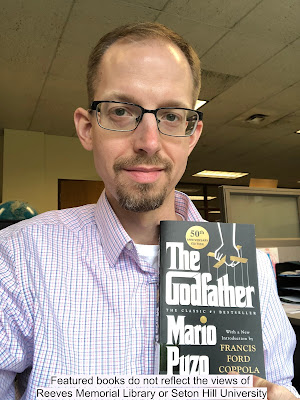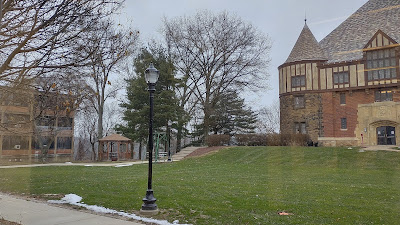You can't accuse Adam of backing down from a reading challenge! For this installment of Friday Reads, he tells us about another ambitious book, Mark Z. Danielewski's House of Leaves, and what makes it so unique and worth the effort.
How to describe this book? It's an experimental novel, wholly unlike any work of fiction I've ever read. I chose it because I was looking for something scary to read in the run-up to Halloween, and while this book is certainly an unsettling work of horror, it's so much more than that, and I didn't realize how truly unusual this reading experience would be. After tackling War and Peace over the summer, and now this book (which, like War and Peace, also weighs a TON), I can say this has been a year when I've definitely challenged myself as a reader.
It's difficult to summarize the story of
House of Leaves, due to its multiple layers of narrative, but I'll do my best. The premise of the book is that Los Angeles resident Johnny Truant discovered a manuscript in a trunk in the apartment of a recently deceased, elderly blind man named Zampano, and Truant ended up piecing it together and sending it off to be published. The manuscript, written by Zampano, is an academic treatise about a documentary called
The Navidson Record, a film which was edited together from video footage by photographer Will Navidson after he and his family moved into a house in rural Virginia with, shall we say, strange properties. The dimensions of the inside of the house are larger than those of the outside, and when a dark corridor mysteriously appears off of one living room wall, leading into an unending, pitch-black labyrinth of corridors and massive chambers, a team is brought in to explore this impossible space, with deadly consequences. The catch, as Truant explains in his introduction to the manuscript, is that he can find no evidence this film or the Navidson family ever existed, in spite of the manuscript's extensive footnotes referencing scores of books, journal articles, magazine articles about the film, all of which are also sources that may not exist. Zampano's text and its footnotes are supplemented by Truant's own interjectory footnotes, through which we learn about Truant's life and personal history, and his increasing obsession with Zampano's manuscript. It is these two narratives, the story of
The Navidson Record, as told by Zampano, and Johnny's story, that are woven together in the book, along with the hundreds of footnotes (many of which have their own footnotes) and lengthy appendices. The book even has an index.
It's such a high-concept piece of writing, often leading the reader down rabbit holes of footnotes and appendices that last for pages and pages. What makes the book even more unique is that this unusual narrative structure is paired with an array of inventive formal choices in the way the text is printed on the page. The word "house" is printed in blue ink, even on the book's cover. There are variations in the typography and spacing in many passages, with some pages only containing a single word or even one letter of a word. Text is sometimes printed diagonally, vertically, in a spiral, or even in reverse. There is one passage that is printed backwards, so you need a reflective surface to read it. While most novels can be seen as escapist, allowing you to lose yourself in the story,
House of Leaves constantly pulls you out of the narrative and calls attention to the book's form. The author makes you work for it.
And yet, I've found it to be a very rewarding reading experience. This book has been billed as horror, but it's so much more than that. There is certainly a lot of uncanny stuff happening, but there's also an affecting love story with Navidson and his partner, Karen, and sometimes the book even feels like a satire of academic writing. There's so much happening, and some questions go unanswered. It's a challenging book to read, but well worth it.


























